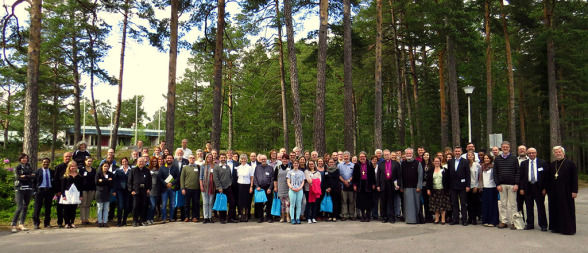European Christian Environment Network (ECEN)
ECEN (founded 1998) is a church network promoting co-operation in caring for creation. Ecological threats transcend national and confessional boundaries. The aim of the ECEN is to share information, experiences in environmental work among widely varied Christian traditions and to encourage a united witness in caring for God's creation. ECEN is the main working instrument of the Conference of European Churches for addressing the need for environmental engagement and responding to climate change.
An effort of joint churches’ action in taking care for creation is closely linked with three European Ecumenical Assemblies in Basel (1989), Graz (1997) and Sibiu (2007). The European Ecumenical Assembly Peace with justice, held in Basel in May 1989 has proved to be an important landmark in cooperation between the 120 member churches of the Conference of European Churches (CEC) and the 25 Bishops' Conferences of the Council of European Bishops Conferences (CCEE). For many churches it was an opportunity to follow the call of the Vancouver 1983 General Assembly of the World Council of Churches to enter now into a conciliar process of mutual commitment (covenant) for Justice, Peace and the Integrity of Creation. Most of the member churches of CEC understand the Basel Assembly also to be a contribution in this "conciliar process". Other churches taking part in the Assembly prefer not to use the term "conciliar process". But all the churches represented in Basel agree that they are committed to an ecumenical process for Justice, Peace and the Integrity of Creation.
After the first Ecumenical Assembly in Basel, there was a joint project group (of CCEE and CEC) lead by Rüdiger Noll (CEC) and Jean Pierre Ribaut (CCEE), which launched a CCEE-KEK Consultation on "Environment and Development - A challenge to our lifestyles" in the Orthodox Academy of Crete (1995). The ecumenical preparation of the Second European Ecumenical Assembly for the care of creation was made in the consultation on "Christianity and Sustainable Europe - the new practice of ecological responsibility" with 125 participants, including the Holy See, CCEE, KEK , EKD many Orthodox Churches (e.g, Moscow) from 22 countries in Eichstatt (Francis of Assisi Academy for the Protection of the Earth and Catholic University of Eichstaett). In Eichstatt the foundation of a european christian environment networf was proposed by Lukas Vischer.
The 2nd European Ecumenical Assembly in Graz, Austria, in 1997 on the theme Reconciliation - Gift of God and Source of New Life further strengthened the need for churches to act and to come in their efforts for integrity of creation with a common witness. In following that spirit the Assembly recommended that a network of persons with environmental responsibilities within the churches should be set up at a European level. ECEN is a response to this call. The network has been established in October 1998 in the Orthodox Academy in Vilemov in the Czech republic.
The 3rd European Ecumenical Assembly in 2007 in Sibiu, Romania, which met under the title The light of Christ shines upon all! further supported these efforts. The Assembly recommended that a consultative process, addressing European responsibility for ecological justice, facing the threat of climate change; European responsibility for the just shaping of globalisation …. be initiated by CCEE and CEC, with the Churches in Europe and with Churches of other continents. At the same time the Assembly recommended that the period from the 1st September to the 4th of October be dedicated to prayer for the protection of Creation and the promotion of sustainable lifestyles that reverse our contribution to climate change.
The aim of the ECEN is to share information, experiences in environmental work among widely varied Christian traditions and to encourage a united witness in caring for God's creation. ECEN, as the main working instrument of the Conference of European Churches for addressing the need for environmental engagement and responding to climate change works closely with the World Council of Churches (wcc-coe.org) and with the European Catholic Bishops' Conference (www.ccee.ch).
Graz (1997) - Final Message - Recommendations for action
A new practice of ecological responsibility, now and with regard to coming generations
5.1. We recommend that the churches consider and promote the preservation of creation as part of church life at all levels. One way would be to observe a common Creation Day, such as the Ecumenical Patriarchate celebrates each year.
Rationale: The seriousness of the ecological dilemma for the future of the human race means that the churches' consciousness of it must be raised. Commitment to preservation of the creation is not a side issue among many others, but an essential dimension of all church work.
5.2. We recommend that the churches encourage the development of lifestyles guided by the principles of sustainability and social justice, and that they support all efforts towards an economy which meets the same criteria.
Rationale: Ecological responsibility must guide personal as well as political and economic actions. The criterion of sustainability gives continued weight to saving energy and to discovery and use of renewable forms of energy. Christians, supported by their congregations and their church, should strive for a lifestyle which sets an example of freeing oneself from the pressure to consume and of valuing a true quality of life.
5.3. We recommend that the churches join the Agenda 21 Process and connect it to the ecumenical or conciliar process for Justice, Peace and the Integrity of Creation.
Rationale: Agenda 21 offers an internationally agreed basis for action which has important aspects in common with the conciliar process for Justice, Peace and the Integrity of Creation. It can be especially helpful in stimulating and organising cooperation with those holding social and political power at the local level.
5.4. We recommend that CEC and CCEE create a network of persons with environmental responsibilities and recognise them as partners in church activities.
Rationale: If the preservation of creation is to be anchored within church life in a politically effective way, it needs to be substantiated by professional competence. The CEC member churches and the CCEE Bishops' Conferences should appoint their own officers for environmental issues, and create a network for them in the form of a suitable organisation with which they cooperate as a partner.









